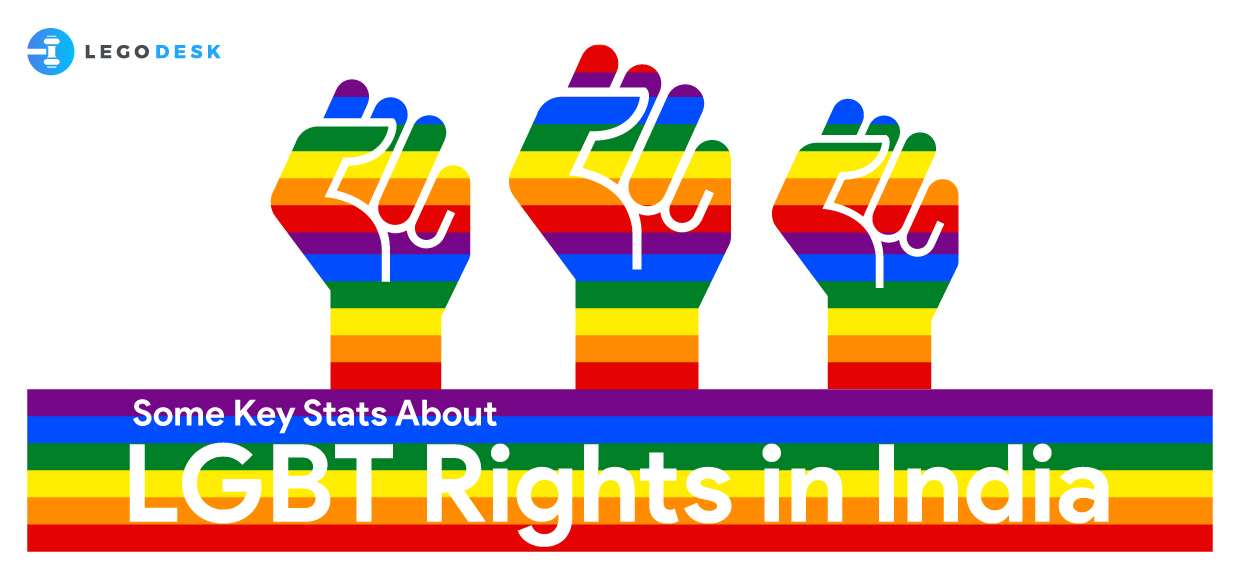
Introduction To LGBT Rights In India
During ancient times, Homosexuality and identity as a transgender were well accepted in India. The archaic laws that until very recently governed sexual activity between two consenting adults reflected the out-dated colonial-era morality of the British empire. Even today, gender identity and sexual minorities in India have been involved in fighting for the recognition of the most basic forms of human rights. Some of these fights have resulted in a victory, however many of the civil and political rights of the LGBT (Lesbian, Gay, Bisexual, Transgender) community remains to be acknowledged in India.
Rights of Homosexual Persons in India:
Up until recently, gay individuals suffered from a gross violation of their sexual autonomy. Previously, Section 377 of the Indian Penal Code (1860), had criminalized ‘voluntary carnal intercourse against the order of nature’. [1]This effectively made gay sex a crime in India. On September 2018, the Supreme Court of India passed a landmark judgment which decriminalized sexual activity between persons of the same gender.[2] This judgment is a stepping stone for LGBT rights in India.
However, the lesbian and gay community are still denied many fundamental human rights in India. Indian laws do not recognize marriage or civil partnerships between same-sex couples, which violates their fundamental rights. People belonging to the LGBT community are also banned from serving in the Indian Armed Forces.
Rights of Transgender Persons in India:
Transgender people are those who do not conform to the gender that they were assigned at birth. This assignment is often based on their biological and sexual anatomy. The term ‘transgender’ also encompasses intersex people who possess ambiguous genitalia. Historically and culturally throughout India, trans and intersex people have been recognized as ‘hijras’ or ‘kinnars’.
In NALSA v Union of India, the Apex Court of India gave legal recognition to transgender people as the ‘third gender’. Under this judicial decision, transgender people were also assured equal protection of fundamental rights within the territory of India. The court also held that the exclusion of the non-binary people from marriage, adoption or divorce is discriminatory.[3]
In December 2018, the lower house of the parliament cleared the ‘Transgender Persons (Protection of Rights Bill)’, drafted in 2014. The transgender community in India alleges that instead of protecting their rights, the provisions laid down in this bill contribute to their violation. This bill provides for the setting up of screening committees at the district level to recognize a transgender person. [4]This outrightly violates their right to life with dignity under Article 21 of the Indian Constitution. Moreover, this is in explicit contravention to the NALSA judgment of the Supreme Court, which recognized a transgender person’s right to self-identification.
Read Also – 5 Recently Asked Questions About Same-Sex Marriage Laws
Rights of Transgender Persons in States:

Certain states have passed laws providing benefits to the transgender community. Odisha, in 2016, was the first to include transgender community within the status of BPL (Below Poverty Line), thus granting them benefits from various schemes. The State of Karnataka made a reservation for transgender people mandatory in educational institutions. Furthermore, Karnataka also mandated the formation of separate toilets for transgender students in educational institutions.
In April 2019, the Madras High Court upheld the right to marry for transgender persons, extending the definition of ‘bride’ under the Hindu Marriage Act (1956) to include trans-women.[5]
Social Status of the LGBT community

According to the Supreme Court, there are 2.5 million gay individuals within India.[6] The Census report of 2011 estimates the existence of 4.8 million non-binary people. The LGBT community in India forms an important section of the total population. This community has been fighting for the achievement of equal rights and their upliftment in society. Although there have been a few legal victories that have ushered in change for the good, the societal stigma faced by these sexuality and gender identity minorities is immense. Transgender and intersex people are often abandoned by their family, therefore forcing them to resort to begging and prostitution. Homosexual people are also sometimes forced married to people of the opposite sex, especially in rural India. There is widespread deprivation of rights of the people belonging to the LGBT community – some due to lack of legislation and others in spite of the existence of legislation.
Laws are the genesis of social change. For a nation to develop, the inclusion of people belonging to different racial, ethnic, gender or sexual identities is essential. Legislations also influence the attitude of the majority section of people towards minorities. In the current situation, there is still a long way to go, to achieve equality. It is only through the elimination of both, legal discrimination and societal stigma that society in India can progress. This was all about LGBT rights in India.
[1] Indian Penal Code 1860, s 377
[2] Navtej Singh Johar v Union of India [2018] 1 SCC 791
[3] National Legal Services Authority v Union of India [2014] 5 SCC 438
[4] The Transgender Persons (Protection of Rights ) Bill 2018, s 5
[5] Arunkumar and Sreeja v Inspector General of Registration and Others [2019] WP(MD)No.4125 of 2019
[6] Suchitra Mohanty and Roli Srivastava ‘ Explain stand on gay sex: India’s Supreme Court Issues Notice to the Government’ (Reuters, 11 December 2013) <https://in.reuters.com/article/india-lgbt-courtlawmaking/explain-stand-on-gay-sex-indias-supreme-court-issues-notice-to-government-idlINKBN1l23h8 > accessed 26 April 2019

